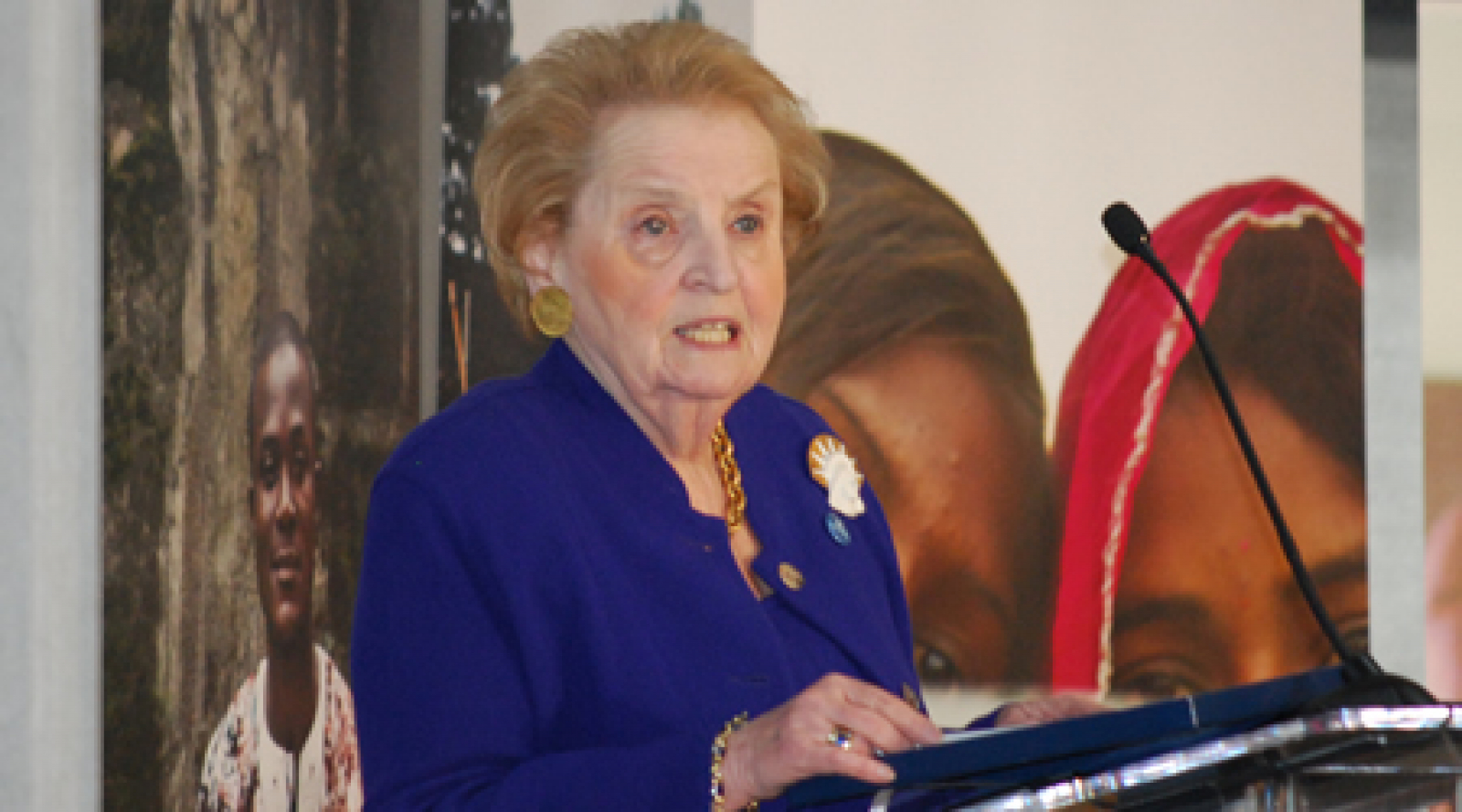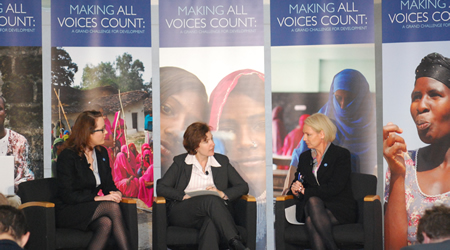
SHARE
Addressing the potential of new information and social networking technologies, former Secretary of State and NDI Chairman Madeleine Albright spoke at the Dec. 5 launch of a new initiative aimed at using technology to improve communications between citizens and their government. “Democracy thrives on diversity and becomes stronger through vigorous debate,” she said. “Its very identity is based on the free expression of popular will.”
More than 150 academics, donors, journalists, technologists and social entrepreneurs attended the Washington, D.C., unveiling of Making All Voices Count (MAVC), a four-year partnership between the United Kingdom’s Department for International Development (DFID), the U.S. Agency for International Development (USAID), the Swedish International Development Agency (Sida), and the Omidyar Network (ON).
Its goal is to support innovations using the Web and mobile technology to help new democracies become more transparent and accountable, and to empower citizens to advocate effectively for change. Citing recent events in Burma, the Middle East and North Africa, Albright noted that “technology has opened the door to further democratic gains” and has enabled citizens around the world to organize at the grassroots level more effectively than ever before.
MAVC programs will focus on Sub-Saharan Africa and Southeast Asia, putting technology to work at the municipal and subnational levels to increase citizen engagement and government responsiveness. Programs will support innovative technology to establish open communication between citizens and government, build evidence to support what works and why, and build on successful initiatives to generate global attention around open government issues. The fund was inspired in part by the Open Government Partnership (OGP), a group of nearly 60 governments that have committed to promote more transparency to improve oversight by citizens and civil society groups.
“Dictators and demagogues learned long ago that having a monopoly on information is the best way to seize and maintain power,” said Albright. “The Making All Voices Count Initiative is based on our understanding that it is more difficult now than it has ever been to control the flow of knowledge—and that is all to the good.”
Other speakers included Rajiv Shah, USAID administrator; Sir Peter Westmacott, British ambassador to the U.S.; Susan Glasser, Foreign Policy editor; Charlotte Petri Gornitzka, Sida director general; Stephen King, partner at Omidyar Network; and Samantha Power, special assistant to the president and senior director for multilateral affairs and human rights on the staff of the National Security Council. Vinton Cerf, vice president and chief Internet evangelist at Google and Justine Greening, U.K. Secretary of State for International Development, also presented via video messages.
 Left to right: Ginny Hunt, Principal for Strategy and Civic Innovation, Google; Susan Glasser, Foreign Policy editor; and Charlotte Petri Gornitzka, Director-General, Swedish International Development Agency (Sida).
Left to right: Ginny Hunt, Principal for Strategy and Civic Innovation, Google; Susan Glasser, Foreign Policy editor; and Charlotte Petri Gornitzka, Director-General, Swedish International Development Agency (Sida).At the MAVC Knowledge Fair after the formal program, NDI shared information about its work in support of more open government around the world. One example was UsPeak, a program in partnership with the Parliament of Uganda that allows citizens to communicate with members of parliament (MPs) via text message, voicemail or a UsPeak call center, and that helps MPs track issues that are important to constituents. Other examples included OpeningParliament.org, a loose network of civil society groups that are advocating for more open parliaments in countries around the world, and the Seguridad con Justicia website, which gave citizens in Mexico the opportunity to ask candidates questions about security and justice reform issues ahead of elections last July and that continue to serve as resources to educate the public about citizen security.
While the power of technology is central to the continued push for open and transparent governments, Albright stressed that it is just as important to make sure citizens and civil society have the ability to take advantage of it to inspire change.
Noting that “technology—for all its promise—has no inherent moral value,” Albright reflected on the use of technology both for good and evil, and the importance of making sure technology is used to “expand knowledge, defend human rights and strengthen democracy.”
“The latest inventions are amazing because they help people to accomplish what they choose. But our future depends on what people choose to do,” she said.
Related:
- Read Secretary Albright's Full Remarks
- Civic Organizations Unite in Landmark Call for Parliamentary Openness and Citizen Participation
- "UsPeak" Puts Ugandans in Touche with their Representatives
- Citizen-Candidate Dialogues in Mexico Seek to Increase Government Responsiveness
Published Dec. 6, 2012


